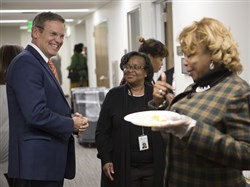VOL. 43 | NO. 8 | Friday, February 22, 2019
Sticking to the script
By Kathy Carlson
Bill Lee the governor sounds a lot like Bill Lee the candidate as he works to implement the policies he brought to Tennessee voters since the Republican businessman announced that he would seek the state’s top job.
During 18 months of campaigning, the political newcomer spoke broadly about good jobs for Tennesseans, good schools for their children and safe neighborhoods. He has followed through on those themes in the agenda for his administration’s first year, adding a push to strengthen the economies of rural counties, 15 of which are economically distressed.
More details on the Lee agenda will emerge during the next week, culminating with the governor’s State of the State message March 4 and the proposed budget for the 2020 fiscal year. The new governor will be presenting his plan to a state legislature that includes 28 new House members, five new senators (six after a special election March 12) and a change in much of the official party leadership.
“I have long believed that we have not put enough emphasis and focus on vocational and technical education in our public-school systems, and education is fundamental – it’s part of my three broad areas,” Lee says of his goals for his first year in office and how his experience in business informs his approach to governing.
Four out of 10 students don’t go on to college, he adds, and the education system needs to give non-college bound students more pathways to success.
His administration’s first proposed legislation – the Governor’s Investment in Vocational Education or GIVE Act – allows local school systems more latitude in partnering with local businesses on vocational education. It also expands use of dual enrollment for students in career and technical education classes.
Gov. Bill Lee addresses the issues
Nashville Police Oversight Board of subpoena power, which Nashville voters approved by referendum:
“Whenever we can get decision making closer to the people, that’s important. But the state also has a responsibility to protect rights of citizens. When a local decision impacts those rights, the state has an obligation to step in.”
There’s already a procedure for the Tennessee Bureau of Investigation to investigate police-involved shootings, Lee adds, and that should be followed.
Health care and how to help those who can’t afford coverage:
Lee wants to look at ways to “lower the cost and not just expand the current broken system that we have.
“That’s how we’ll make it most affordable, that’s how we’ll be able to expand access to every Tennessean. We’re looking at opportunities and ways to do that.”
Lee says he also is seeking ways to work with the federal government to have more flexibility in how the state can use federal dollars to provide health care so it can cover more people.
– Kathy Carlson
It provides funding to expand the credits high school students can earn in vocational courses and allows those credits to be used in the state’s vocational colleges, or TCATs. All of the GIVE Act’s funding would come from state lottery revenues.
Vocational education is important to people in Sen. Steve Southerland’s district northeast of Knoxville. The district includes Cocke County, one of the state’s 15 economically distressed counties.
In past legislative sessions, Southerland, R-Morristown, has supported increasing the number of dual-enrollment courses for high school students from two to four, as the GIVE Act does with vocational courses.
This session, Southerland and Rep. David Hawk, R-Greeneville, are co-sponsoring legislation that would allow students to take the ACT WorkKeys National Career Readiness Certificate examinations in lieu of retaking the postsecondary readiness examination required in their junior year of high school. Southerland says employers are increasingly using NCRC exam scores to evaluate job applicants. The test covers three topics: applied math, workplace documents and graphic literacy.
Rep. Harold Love Jr., D-Nashville, says he welcomes the focus on vocational education but also wants to make sure that the state supports its traditional four-year colleges, and that K-12 education overall receives financial support.
The Lee administration continues to work on another aspect of its educational agenda, school-choice programs, which Lee says he believes improve educational outcomes for students.
Lee says improving vocational education promotes good jobs because it will “develop a workforce that has a broader, diverse range of skills. It’s going to improve outcomes for kids getting out of school but also make for a more attractive business environment.”

Gov. Bill Lee talks to actress and author Kimberly Williams Paisley, wife of country performer Brad Paisley, at the recent Alzheimer’s Association Day on the Hill Luncheon.
-- Photo By Michelle Morrow |The LedgerOne of the greatest needs that businesses express is for a more developed and skilled workforce, and improving skills will lead to better jobs, he adds.
“Lack of skilled tradespeople is the most common complaint I hear from Chattanooga area businesses,” Rep. Mike Carter, R-Ooltewah, says. “I’m extremely proud to support Bill Lee’s GIVE initiative, which I believe will help students gain skills needed right now in the workforce.”
Rep. Patsy Hazlewood, R-Signal Mountain, says her constituents will be most affected by the added emphasis on vocational education.
“We have family-wage jobs available in Hamilton County that employers have difficulty filling because of the lack of technically trained personnel,” she says. “With additional support for and focus on this type training, I believe my constituents will be better prepared for job opportunities and employers will be even more willing to grow their businesses in our area.”
To encourage safe neighborhoods, initiatives will focus on re-entry and reducing recidivism, areas of personal interest to Lee, who has worked as a volunteer with men re-entering society after serving time in prison.
The administration is “re-examining the criminal justice intake process, to make sure that people get into appropriate programs” such as drug, veterans and mental health courts, Lee says. This will help the state “be smarter about who we incarcerate and how we re-enter them … at the same time being tough on those violent criminals we need to be tough on.”
Democrat Love says much of what the governor is proposing on criminal justice reform, as well as on education, aligns with what he advocates. He also sees areas of common interest on sentencing reform, dealing with the opioid crisis and vocational education.
Senate Democratic Leader Jeff Yarbro agrees that Gov. Lee’s agenda can overlap in several areas with that of Democrats, especially in workforce development, improving economic access in poor counties and improving the criminal justice system so that it’s more cost effective for the state and better for the people and families affected.
“These are areas that Democrats have led, and we can work to partner with him to the extent that he attempts to do something meaningful,” Yarbro says, adding everyone is for criminal justice reform and rural economic development, but the devil is in the details.

Gov. Bill Lee interacts with guests at a recent historically black colleges and universities luncheon at the Cordell Hull Building.
-- Photo By Michelle Morrow |The LedgerThere also are areas in which Democrats disagree with Republicans, such as on school vouchers, Yarbro points out. Democrats can better engage with the Lee administration’s agenda, he adds, after it has been spelled out in greater detail in its proposed budget and in legislation.
It will be interesting, Yarbro says, to see how the administration interacts with Republican legislators, especially with those more interested in hot-button issues such as banning abortion in the event the U.S. Supreme Court overrules or scales back the 1973 abortion rights case known as Roe v. Wade.
Lee, for his part, has reached out to both Republican and Democratic lawmakers to build the kinds of relationships that were critical to the success of his home and commercial HVAC and maintenance business, Lee Company.
“In business, that’s how you do business – by relationships,” he says. “I believe that’s how we make progress in life, how we find common ground, address challenges (and) develop relationships that allow us to understand each other and work together.”
Adversarial relationships usually don’t last, Lee says, because business moves forward through mutually beneficial relationships.
Lee adds he has known state legislators through his business career and met more as he campaigned for governor. Since becoming governor, he and his wife, Maria, have hosted dinners with lawmakers at the executive residence to get to know them personally and not just to talk policy.
“I’ve enjoyed the first four weeks of getting to know legislators,” he says. “It’s been a great joy to us and to me. I’ve already developed some great friendships on both sides of the aisle.” He says lawmakers are “great public servants to work together with.”
Tennesseans share more interests in common than subjects that divide them, Lee notes, adding he wants to be the governor of every Tennessean.
“That means serving all and helping develop relationships, particularly in the legislature, with people that are all desirous to serve,” he says.
“We want the same things for people, for Tennesseans, we just have different approaches. I do believe that working together is the way to get things accomplished.”